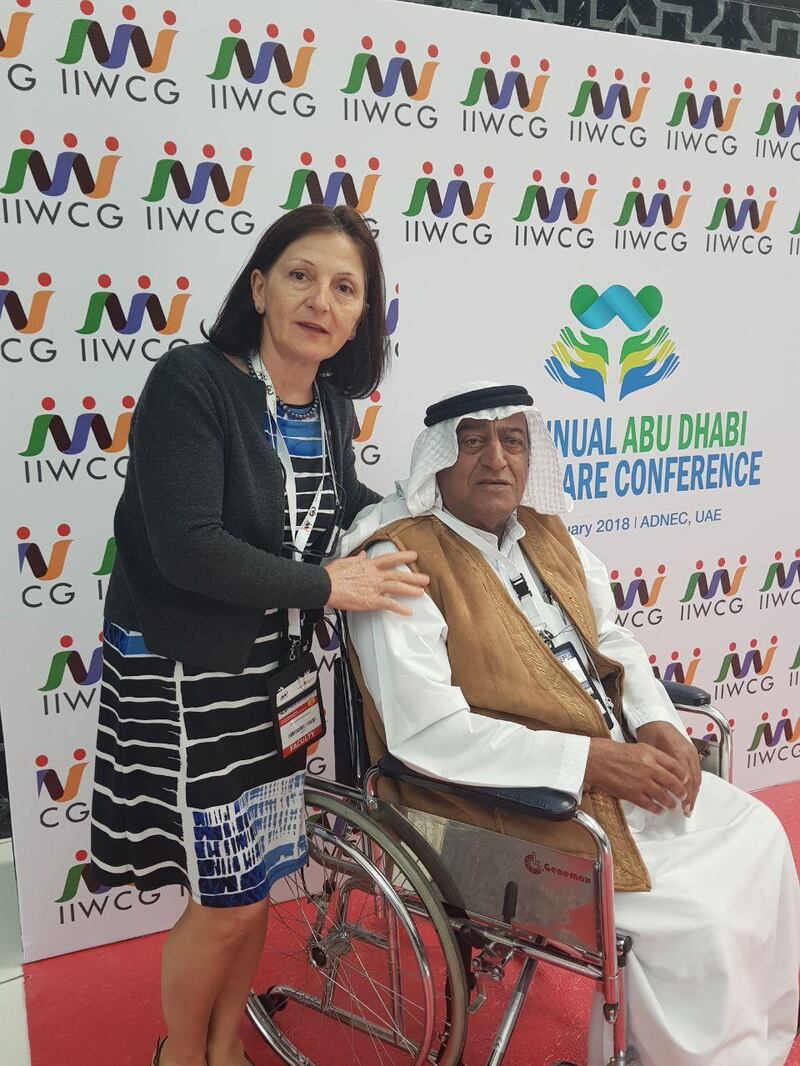Diabetics are needlessly undergoing amputations due to a lack of specialised wound or diabetic foot care centres in the UAE, doctors have said.
Speaking at the ninth annual Abu Dhabi wound care conference, Gulnaz Tariq, conference chair and unit manager for wound care at Sheikh Khalifa Medical City, said more centres were needed to prevent amputation.
“We know that every third person in the Gulf is suffering from diabetes so the prevalence is really high but also the complications are very high with many suffering from renal and foot problems but there is a lack of centres for follow-up.
“There are only two diabetic centres in Abu Dhabi but these centres don’t cater to patients with foot problems or do screenings for them,” he said.
The lack of centres is causing Emiratis to travel abroad for treatment but for 68-year-old Ahmed Al Mansoori, that is no longer an option.
The father of five was diagnosed with diabetes in his mid-forties and in 2016 began feeling extreme pain in his right foot that spread to his ankle.
“I couldn’t stand from the pain,” he said.
Mr Al Mansoori visited almost every hospital in the country but was turned away with only painkillers.
_______________
Read more:
Experts warn diabetes patients to take care of wounds
Oxygen unit halves need for diabetic amputations
Act fast or risk losing a limb, UAE amputee urges diabetics
_______________
“They would give me Panadol and antibiotics for the swelling in my leg. No one even laid a finger on it and asked me where the pain was.”
Not once was he referred to a podiatrist, he said. Three of the country’s nine podiatrists reside in Abu Dhabi. In Paris alone, there are 900 podiatrists, said Healthpoint Podiatrist, Gerald Baudrillard.
Unsatisfied with what doctors were telling him, Mr Al Mansoori booked an appointment with Dr Golnar Prudhomme, Clinical Associate in the Heart and Vascular Institute at Cleveland Clinic Abu Dhabi, who has a doctorate in paediatric medicine and is a specialist in wound care.
Dr Golnar immediately set about trying to save Mr Al Manssori’s leg by putting it in a specialised cast.
Had he not insisted on seeing a specialist Mr Al Mansoori would have lost his leg, she said.
“I’ve seen 4,500 patients in the less than almost two years I have been here and this is just me and one nurse. We are very busy but we take our time. In the past year, I’ve seen ten patients like Mr Al Mansoori where their leg is deformed and needs reconstruction,” she said.
Mr Al Mansoori suffers from Diabetic Charcot Ankle deformity and needs reconstructive surgery by an orthopaedic surgeon but there are none in the UAE, Dr Golnar said.
Emiratis are eligible for government-funded treatment abroad if they cannot be treated in the UAE but because Mr Al Mansoori already went to Germany – where he was sent home with footwear too small – he cannot travel again.
“Mr Al Mansoori was denied permission because he already went to Germany and they only sent him back home.”
Dr Golnar is now pushing for him to get treatment in the United Sates where she has confirmed that treatment is available.
Wheelchair-bound, Mr Al Mansoori cannot walk without support.
“Without surgery he will lose his leg because there is inflammation that can also affect the rest of his body. His life is in danger,” said Dr Golnar.
But with such high rates of diabetes in the UAE, Mr Al Mansoori says there should be more resident podiatrists and orthopaedic surgeons.
“I would rather not go abroad but if the option is not even available here,” he said.
Dr Jassin Hamed, Internal medicine at SKMC said that in Abu Dhabi alone around 20 per cent of the population suffer from diabetes of which 40 per cent develop wounds.
With around 65 per cent of all diabetic wounds becoming infected, Ms Tariq says the solution is to have specific diabetic centres in the UAE that offer footwear that is crucial for diabetics with leg problems.
“We see around 40 to 50 patients per month with diabetic foot and we have around 300 to 400 patients per year with foot problems. If not treated properly it could lead to amputation,” she said.
“With the proper centres, footwear and podiatrists, then we can prevent amputations.”






